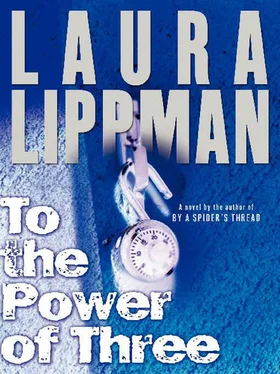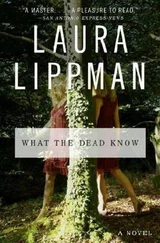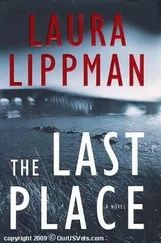“This is different.”
“I don’t see how. There needs to be something truly forbidden about Jud’s love for Laurey. When the play was first produced, they got that over with his love for dirty postcards. But those things seem pretty innocuous now. I wouldn’t play him as a girl, but the fact that I am a girl would inject that sense of menace that Jud’s character has lost over the years.”
“The songs are written for a baritone.”
“We perform with a piano, not an orchestra. It wouldn’t be hard to transpose the songs to a suitable key for me.”
As it turned out, there was something chilling about Perri’s version of “Lonely Room,” and a comic poignancy in her version of “Pore Jud Is Daid.” All the students who saw that audition knew that no boy in the school could touch her subtle performance. But even in the allegedly hate-free zones of Glendale High School, there were boundaries. If Dale Hartigan had been troubled by the idea of his daughter in a negligee, singing suggestively about her own body, how would he react to a girl-even a girl disguised as a boy-singing a love song to Kat?
Old Giff told Perri that she simply wasn’t large enough to create the physical threat that Jud needed to convey. She settled for the part of Gertie, a small but showy part, and Giff cast a wonderful baritone from the school chorus as Jud. This boy’s mother also complained, accusing Giff of perpetrating old stereotypes by having an African-American boy pine for a blue-eyed blonde.
Given all this drama, it was several weeks before anyone noticed that Perri wasn’t speaking to Kat, not outside their scenes together. She would deliver her lines with her usual professionalism but retreat between scenes, seeking as much distance as she could from Kat, giggling with Dannon, the wardrobe manager. And if Kat spoke to her offstage, Perri openly snubbed her.
Old Giff summoned Josie, who had signed up for dance troupe as she always did. It meant spending more time with Kat and Perri, and the dancers always needed someone little to throw around in the dance numbers.
“What gives?” he asked. “Is Perri mad at Kat because Whistle got canceled? Because it really had nothing to do with Dale Hartigan, no matter what everyone thinks.”
“I don’t think that’s it,” said Josie, who had asked Kat and Perri the same thing. But she asked them again, only to receive the same nonanswers.
“Ask Kat,” Perri said. “If she’ll tell you.”
“Perri’s just moody,” Kat said. “I didn’t do anything.”
PART SIX. Commencement
34
Graduation day startedwith a yellow-red haze on the horizon, the kind of sky that promised a long, sticky day and thunderstorms late in the afternoon. Eve, walking with Claude and Billy, thought about what she should wear-not to school but tonight, when she planned to meet Val and Lila for the Senior Ramble. Because she would have to slide quietly along the porch roof beneath her bedroom window, she definitely had to wear pants, dark ones. But perhaps a halter beneath her flannel shirt, and her new sandals, which were adorable. She would have to carry them in her hand, given their height, but she could change into them once she was in Val’s car.
The Ramble was supposed to be for seniors only, of course. The other students at Glendale were expected to be in class tomorrow, fresh and rested. The perquisites of graduation-the curfew-free night, the specials at the restaurants and ice cream shops that stayed open late, the chain of supervised parties across the valley-were not theirs to sample But every official celebration eventually ends up with an unofficial partner, and while the seniors of north Baltimore County had been granted this night of controlled, alcohol-free partying, the other classes felt free to hold their own shadow party, one with fewer rules and controls. “Which means we get to have more fun,” Val said, “because we didn’t have to sign any stupid pledges.”
Eve’s mother remembered the Ramble in its earliest incarnation, when it began as a spontaneous car rally, the newly minted seniors driving around and around because there was no place to go, other than the Dairy Queen, and even that closed at ten back then. Over the years, as proms had migrated to downtown hotels, the Ramble had become the all-night prowl of choice, with parents volunteering to hold open houses and students agreeing to accept designated-driver status. Last year, after Seth, Chip, and Kenny had died in the car accident on Old Town Road, the Ramble had almost been canceled. But then it was decided that the student drivers would register and agree to wear red wristbands, so if one appeared under the influence in any way-which they shouldn’t, being eighteen, but alcohol had a way of sneaking into such things-he or she would be sent home, along with those who had signed up to ride in that particular car. Student drivers may risk many things, but their parents believed that the wrath of their peers would achieve what nothing else could.
Last year Eve had not been sufficiently bold to try to sneak out for the entire night. She had made excuses to Val and Lila, who accepted them with their usual nonjudgmental nonchalance. But she felt it was important to join them tonight, to prove herself worthy of their friendship.
Dannon was going to runthe lighting board for the graduation ceremony, costuming not being much of an issue. He had helped distribute the caps and gowns earlier in the week, and he would have the unenviable job of collecting them at the end of the evening, tracking down the crying girls and the high-fiving boys, who threw their caps in the air despite repeated admonitions.
The lighting scheme was relatively simple, at least-no split-second blackouts, no spots, no special filters-but Old Giff was a perfectionist about anything produced on his stage, and he had insisted on this tech run-through.
“At this point the senior members of the chorale society will come center and sing the ‘Desiderata,’ so we’ll need to bring the lights up on the apron, but I don’t want the rest of the stage completely dark,” he told Dannon, looking at his typed rundown. “Then they return to their seats, and we have the presentation of the Hartigan scholarship, boom, diplomas, boom, recessional, and out .”
“Three hundred seventy-five names,” Dannon said. “It’s going to take forever. Especially if people clap for individual students, and they always do, no matter how many times they’re told not to.”
Not that he had anywhere to go or anyone to go there with. He just couldn’t imagine anything more boring than listening to a list of names.
“Three hundred seventy- seven .”
“So if each student takes five seconds, which makes twelve students per minute, a hundred twenty students per ten minutes…” Dannon’s voice trailed off, math not being his strong suit. “Well, more than half an hour.”
“I’m counting on Principal Paulson to make it brisker than that. Even she gets bored around the J ’s, starts speeding up without realizing it.”
The phone in the lighting booth rang, the short, staccato rings of an in-house call. “Gifford, speak!” Old Giff commanded in his usual tone of bored impatience. But his imperiousness instantly faded.
“Yes? Yes . He’s right here. No. Of course, right away.”
The face that Giff turned toward Dannon was pitying. No, not pitying, and maybe not pitiful either, as pity was a cheap emotion, distant and uninvolved. Giff was as affected by whatever he had heard as he expected Dannon to be. That could mean only one thing.
“She’s dead. Perri’s dead.”
“She will be. Her parents have decided to turn off all the life-support machines, but they will wait for you to get there. Once everything is off-they don’t know, Dannon. It’s not like turning off a light switch, and there’s always a chance-although not much of a chance-that a person might surprise doctors, start breathing on her own. But I’ll take you down, and I’ll wait there with you.”
Читать дальше












